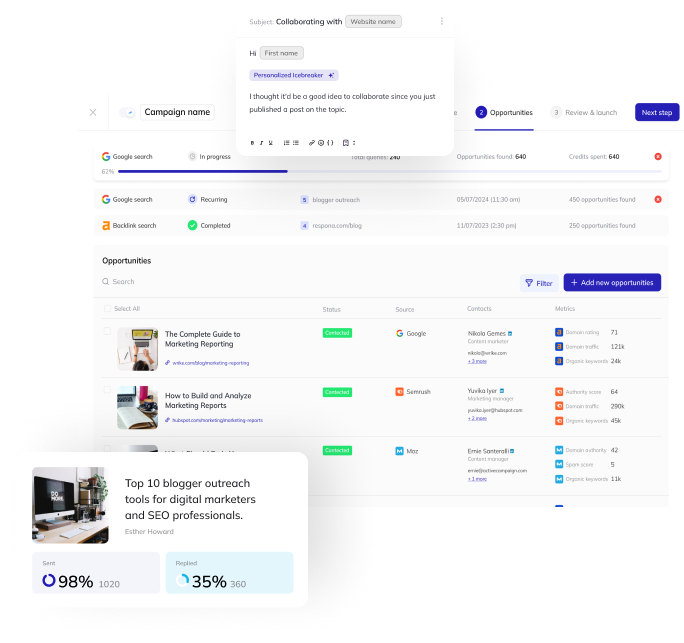Both influencer and affiliate marketing are very popular digital marketing strategies in 2024.
In fact, last year, 39% of marketers invested in influencer marketing (according to HubSpot), and affiliate marketing is used by a whopping 83% of marketing teams (according to Demand Sage).
It goes without saying that some of these teams are utilizing both strategies at the same time.
But what makes them so good?
In this article, we will be talking about:
- What is influencer and affiliate marketing, and what are their pros and cons
- The similarities between influencer and affiliate marketing
- How to pick which strategy is best for your business
Let’s get into it.
Link building cheat sheet
What is Influencer Marketing?
Influencer marketing is a popular form of social media marketing that mainly focuses on influential personalities that have a social following.
It doesn’t have to be a huge following; micro-influencers, for example, may have only a couple of hundred followers.
These individuals, known as influencers, have earned the trust of their followers through their authenticity, originality, and authority in their field.
They collaborate with brands to promote their products or services to their engaged followers, using their influence to help businesses reach wider audiences.
Some influencers do it for a sponsorship, and others become their brand’s affiliates.
In the case of the latter, influencer and affiliate marketing become essentially synonymous.

A classic example of influencer marketing is when a popular fitness guru on Instagram partners with a health supplement brand.
The influencer might create posts or stories using the brand’s products, demonstrating how it fits into their daily routine.
This not only puts the product in front of a large, engaged target audience but also provides the brand with a powerful endorsor respected by the consumers – ultimately resulting in more sales.
Influencer Marketing Goals
The top 5 goals for running influencer marketing campaigns are:
- Increasing brand awareness
- Lead generation
- Increasing sales
- Creating Content
- Community Building

Since most influencers are content creators (either videos, social media, or blogs), these goals are typically achieved through creating high-quality content that mentions brands in a positive light.
How is Influencer Marketing Tracked?
Influencer marketing campaign tracking involves a lot of the same KPIs you would use to track your own organic reach.
These include, but are not limited to:
- Engagement Rate: likes, comments, and shares influencer posts.
- Reach and Impressions: reach is the unique views a post gets, while impressions are the total number of times the post was displayed.
- Website Traffic – the amount of unique traffic an influencer is driving to your site.
- Click-Through Rate (CTR): the percentage of users who clicked on the link provided by the influencer.
- Conversion Rate: how many users completed a desired action, like making a purchase or signing up for a newsletter.
- ROI (Return on Investment): the profit made from the campaign compared to its cost.
Common tools used to measure these are Instagram’s Insights, YouTube Analytics, Hootsuite, Sprout Social, BuzzSumo, and even affiliate tracking software like Refersion, TapMango, and Post Affiliate Pro.

Influencer Marketing Pros and Cons
Pros:
- Raises brand awareness
- Generates trust
- High-quality UGC
- Higher engagement
- More targeted than other forms of marketing
Cons
- Can be costly.
- Choosing the right influencer who aligns with your brand’s ethos and messaging can be challenging.
- Once influencers publish their posts, businesses have less control over the audience’s reaction or comments.
- Some accounts inflate their metrics or buy fake followers to appear more influential than they are.
- Influencer posts might only have a short-term effect, especially on fast-moving platforms like Instagram or Twitter.
What is Affiliate Marketing?
Affiliate marketing is a performance-based marketing strategy where companies partner with individuals or other companies, known as affiliates.
Affiliate marketers promote the company’s products or services and earn a commission for every sale, click, or lead they generate through their referrals.

Unlike social media influencer marketing, which relies on the authenticity and personal brand of influencers, affiliate marketing can be done by anyone, regardless of their social media following or influence.
The prime focus in affiliate marketing is on driving conversions – whether that’s a purchase on the company’s site, a form submission, or app download.
Let’s consider an example.
Suppose you run a blog reviewing tech gadgets. A headphone company might give you an affiliate link to their products.

Every time one of your readers buys a headphone set using your link, you earn a commission.
Whether you have millions of followers or just a few dedicated readers, the company benefits by having its headphones showcased to a targeted audience, and you benefit from the sales you help generate.
Affiliate Marketing Goals
The principal goals of running an affiliate program are to drive conversions and increase sales.
Brand exposure and awareness are inherent benefits, but the main aim is to spur a direct result through the affiliate’s own platforms – be it a sale, a lead generation, or a specific action like a download or a form submission.
Ultimately, the goal is to tap into the affiliate network to reach potential customers that the brand might not be able to reach on its own.
How is Affiliate Marketing Tracked?
The KPIs for tracking affiliate marketing campaigns are mostly the same as for influencer marketing: traffic, CTR, conversion rates, and, of course, revenue.
To track these KPIs, there’s reliable software like Voluum, Post Affiliate Pro, or Everflow.

These platforms offer features like real-time tracking, detailed analytics and reporting, as well as support for multiple types of campaigns.
Feel free to refer to our top affiliate tools list for more affiliate management and recruitment software suggestions.
Affiliate Marketing Pros and Cons
Pros:
- Affiliate marketing saves on the cost of advertising since affiliates are paid only for results like sales or leads.
- Payments are made based on successful transactions, minimizing the risks of wasted investments.
- When affiliates post links back to your website, it helps improve your site’s search engine ranking.
- Through affiliates, your brand can reach new, targeted audiences that you might not be able to access on your own.
- With various software options available, tracking the performance of your affiliate marketing efforts is relatively simple.
Cons:
- Brands have less control over how affiliates market their products, which may lead to a misrepresentation of the brand.
- Tools that block ads can prevent affiliate marketing materials from being displayed, limiting your reach.
- While you only pay for conversions, a high commission rate can eat into your profit margins.
- There are some people who might try gaming the system to earn commissions without generating real leads or sales, posing potential harm to your brand and costs.
- Over-reliance on affiliate marketing can create dependency, risking your brand’s growth sustainability. This is especially concerning if your top affiliates decide to stop promoting your products.
Similarities Between Influencer Marketing and Affiliate Marketing
While influencer marketing and affiliate marketing are distinct strategies, they do share some commonalities.
Firstly, both involve a partnership between a brand and an individual or entity to boost the brand’s visibility and reach.
In both strategies, these partners leverage their own platforms – such as a popular social media platform account or a high-traffic website – to promote the brand’s products or services.
Secondly, both rely on the trust and relationship the partner has established with their audience.
Whether it’s a brand ambassador sharing their personal experience with a product, or an affiliate recommending a service they trust, the audience’s faith in the partner’s authenticity is the ultimate deciding factor for both strategies’ success.
For example, Brian Dean from Backlinko is universally seen as an SEO guru within the niche, so an endorsement from him would mean the world to any business he promotes.

Lastly, the way both strategies are tracked is extremely similar – you can even use the same tools to manage both your influencer and affiliate marketing campaigns.
Is Influencer or Affiliate Marketing Better for You?
Choosing between influencer marketing and affiliate marketing, or deciding to use both, depends on several factors.
If your primary goal is to increase brand awareness and you’re targeting a younger demographic that closely follows social media trends, influencer marketing might be the best route.
If the goal is driving sales or conversions with a pay-for-results model, affiliate marketing is the smarter choice.
Influencer marketing can sometimes be more expensive, whereas affiliate marketing is generally more cost-effective.

Certain products lend themselves better to demonstrating in a lifestyle context, like fashion or beauty items – making them suitable for influencer marketing.
More complex or niche products might benefit more from the detailed reviews or walkthroughs that affiliates typically provide.
Sometimes, a blend of both strategies can be beneficial. This might allow you to capture a larger, more diverse audience, cater to different user behaviors, and create multiple touchpoints for potential customers.
Link building cheat sheet
Now Over to You
So, in conclusion, influencer and affiliate marketing work best when utilized together – provided that you have the budget for recruiting influencers.
Speaking of recruitment – if you need any help with influencer or affiliate outreach, don’t hesitate to start your 14-day free trial with Respona to see first-hand how we can help.
Frequently Asked Questions (FAQ)
What is the main difference between influencer marketing and affiliate marketing?
Influencer marketing focuses on leveraging influential figures to promote a brand’s product or service to a broader audience.
In contrast, affiliate marketing is a performance-based strategy where a brand pays a commission for conversions brought by an affiliate’s marketing effort.
Can you be both an influencer and an affiliate marketer?
Yes, an influencer can also be an affiliate marketer.
Combining these approaches means the influencer promotes a product to their audience, and also earns a commission for any sales or conversions generated from their referral link.
Which type of marketing is more cost-effective, influencer marketing or affiliate marketing?
This largely depends on the specific campaign and execution. Affiliate marketing can often be more cost-effective as payment is performance-based.
However, if an influencer has a highly engaged audience that trusts their product recommendations, influencer marketing can yield a higher return.
How is success measured in influencer marketing vs. affiliate marketing?
In influencer marketing, success is often measured by the level of engagement (e.g., likes, comments, shares), reach, and impressions.
In affiliate marketing, success is usually gauged by the number of conversions (sales, sign-ups), click-through rates on affiliate links, or revenue generated.
Can influencer marketing and affiliate marketing be used together?
Absolutely! Many brands utilize both strategies for maximum impact.
An influencer might use affiliate links in their promotional posts, for instance, allowing brands to track sales made through the affiliate partnership and allowing them to earn a commission on the sales.
This pairing leverages the trust inherent in influencer-audience relationships while creating a tangible, trackable metric of success.






